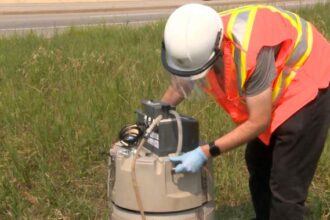In a remarkable display of survival instinct and quick thinking, 38-year-old Colin Harrison of Prince George, British Columbia lived to tell the tale of his harrowing encounter with a grizzly bear that nearly cost him his life. The experienced outdoorsman credits his amateur boxing background with giving him the fighting chance that ultimately saved him from the jaws of the 700-pound predator that attacked him during a routine hiking expedition last weekend.
“I never thought those Saturday mornings at the gym would prepare me for fighting off a grizzly,” Harrison told me during our exclusive interview from his hospital bed at University Hospital of Northern BC. “When that bear charged, something clicked—my hands came up automatically, just like in the ring.”
The terrifying encounter occurred in the remote backcountry of Mount Robson Provincial Park, where Harrison was hiking alone—a decision he now acknowledges was his first mistake. According to wildlife conservation officers, the area has seen increased bear activity this year due to a poor berry harvest, forcing the animals to range farther for food sources.
What makes Harrison’s survival particularly extraordinary is the severity of his injuries. The grizzly’s initial attack was devastating—tearing away portions of his scalp, ripping his lips, and causing significant trauma to his face and neck. Despite these horrific wounds, Harrison maintained consciousness throughout the ordeal.
“The bear had my head in its jaws. I could feel my scalp tearing,” Harrison recounted, his voice still raspy from his injuries. “But instead of freezing, I started throwing punches at its throat and eyes—anywhere I thought might be sensitive.”
Conservation Officer Melanie Weber, who investigated the attack site, told CO24 News that evidence at the scene corroborated Harrison’s account. “We found blood evidence consistent with his description, indicating he did indeed fight back aggressively. Most victims aren’t so fortunate.”
Wildlife experts emphasize that Harrison’s response, while successful in this case, isn’t the recommended protocol for all bear encounters. Dr. James Forrester, wildlife biologist with the Canada Wildlife Federation, explains: “In most cases, playing dead is still advised for grizzly attacks, which are often defensive. But in situations where the attack persists, fighting back may become necessary for survival.”
After the bear finally retreated, Harrison faced another monumental challenge—making it back to civilization with catastrophic injuries. Despite blood loss and shock, he managed to navigate three kilometers of difficult terrain to reach his vehicle.
“I kept thinking about my daughters,” said Harrison, a single father of two. “There was no way I was going to die on that mountain and leave them.”
Harrison’s story has captivated World News outlets, with survival experts calling his escape “one for the textbooks.” His surgeon, Dr. Meredith Lantz, described his injuries as some of the most severe she’s seen in a patient who survived to reach medical care.
“The human will to survive is powerful, but what Mr. Harrison demonstrated goes beyond that,” Dr. Lantz said. “His physical conditioning and presence of mind under extreme duress made the difference between life and death.”
BC Parks officials have temporarily closed several trails in the area while conducting a thorough assessment of bear activity. They’ve also issued enhanced warnings to hikers throughout the region, emphasizing the importance of traveling in groups and carrying bear spray—something Harrison admits he had but couldn’t access quickly enough when the attack occurred.
As Harrison begins his long road to recovery, facing multiple reconstructive surgeries over the coming months, his story raises important questions about wilderness preparation and wildlife management in Canada’s increasingly fragmented wilderness areas. As human recreation pushes deeper into bear territory, how do we balance our desire to experience nature with the realities of coexisting with North America’s apex predators?







